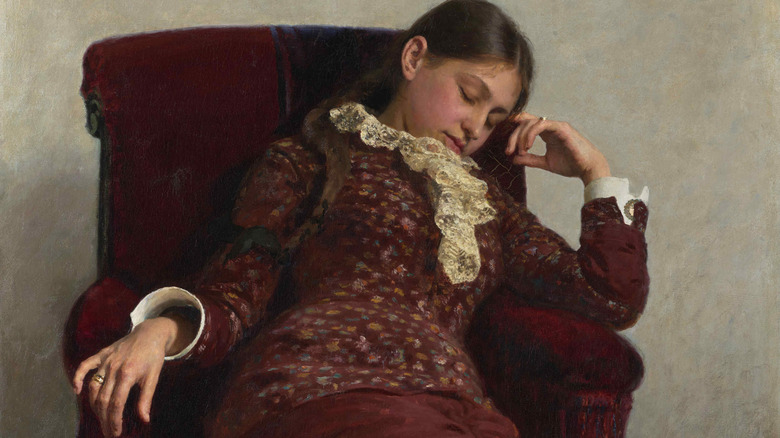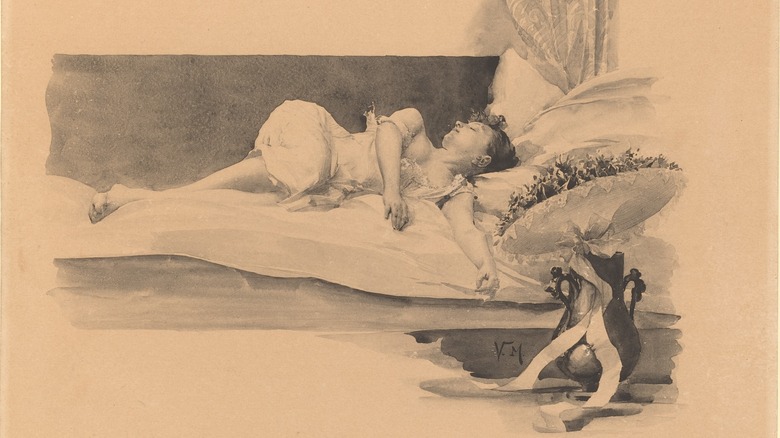Meet Ellen Sadler, The Girl Who Allegedly Went To Sleep And Didn't Wake Up Until Years Later
We've all heard of Rip Van Winkle — the man who fell asleep one day and remained in slumber for 20 years in the classic 1819 short story written by Washington Irving (per the National Museum of American History). Sleeping for two decades sounds like the stuff of fanciful fiction — and in Van Winkle's case, it is. But only a few decades after Irving wrote "Rip Van Winkle," in 1871, an 11-year-old girl in England named Ellen Sadler fell asleep, and she didn't wake up for nine years, according to Bucks Free Press (a weekly news publication in Buckinghamshire, England near Turville, the village where Sadler lived).
Known today as the "Sleeping Girl of Turville," it was not some spell or hex that induced Sadler's nine-year slumber. Instead, Sadler's prolonged bout of sleeping is believed to have been caused by a very real medical condition. It all goes to show that sleeping for years on end could be more than just the product of a 19th-century author's imagination.
Doctors attended to Sadler
As Bucks Free Press goes on to note, Ellen Sadler was one of 12 children, and she had health problems prior to her prolonged bout of sleepiness. Just a matter of days before she fell asleep for nine years, she spent time in the hospital. As was often the case in that era, at age 11, she had already left home to work as a nursemaid in the nearby town of Marlow, according to Amusing Planet.
While in Marlow, though, Sadler reported headaches, discomfort, and drowsiness, so much so that she was unable to adequately perform her job. The young girl returned home to Turville, where she spent time in the hospital. After 18 weeks, she was released, still unwell — doctors at that time simply didn't know how to help her (per Amusing Planet). Soon, Sadler suffered a series of seizures in her home and laid down one night and fell asleep. She didn't wake up until almost a decade later.
She became an attraction
Based on reporting from Bucks Free Press, while Ellen Sadler slept, she became something of a spectacle as people traveled from all around to marvel at the mystery. While asleep, Sadler's mother, Ann, fed her fluids, like tea and milk. Before long, Sadler's mouth locked shut, and Ann had to provide nourishment with a teapot, the contents of which were poured through a missing tooth gap in her mouth (via Amusing Planet). In time, her body stopped passing solid waste, and she only periodically expelled fluids. Some visitors poked her with pins to try and wake her up.
Doctors and reporters dropped by the Turville home of the Sadler family, which came to be known as the "Sleepy Cottage" (pictured), but none could explain what had happened. According to Amusing Planet, a writer for The Daily Telegraph described color in Sadler's lips and in her cheeks, but her body was very thin. "There is not much substance in her flesh, however; it is soft and flabby," they wrote. Her feet were ice-cold, the writer observed. "As regards the child's breathing," the report continued, "it is so feeble that it is almost impossible to detect it."
Could it have been a hoax?
Over time, as Amusing Planet writes, the Sadler family gathered donations to care for their daughter while she slept, and this led some to speculate that her condition was faked by the family for money. Ann, Sadler's primary caretaker, died from a heart attack in 1880, and shortly after, Sadler woke up. Because of this, some wondered if the mother had perhaps drugged her daughter. Ann also turned down offers to have Sadler examined in a London hospital, and she never let doctors stay with her daughter for very long. Some also reported seeing Sadler sit near the window at night.
Suspicions of fraud notwithstanding, medical experts today think Sadler could have experienced narcolepsy, a chronic sleep disorder characterized by sudden attacks of sleepiness or unusual bouts of sleeping, according to Mayo Clinic. When Sadler awoke, she had no memory of the previous nine years. Her growth was somewhat stunted, and she had vision problems, but her health was otherwise unaffected. She later married and gave birth to six children. She died around 1911 (per Amusing Planet).



